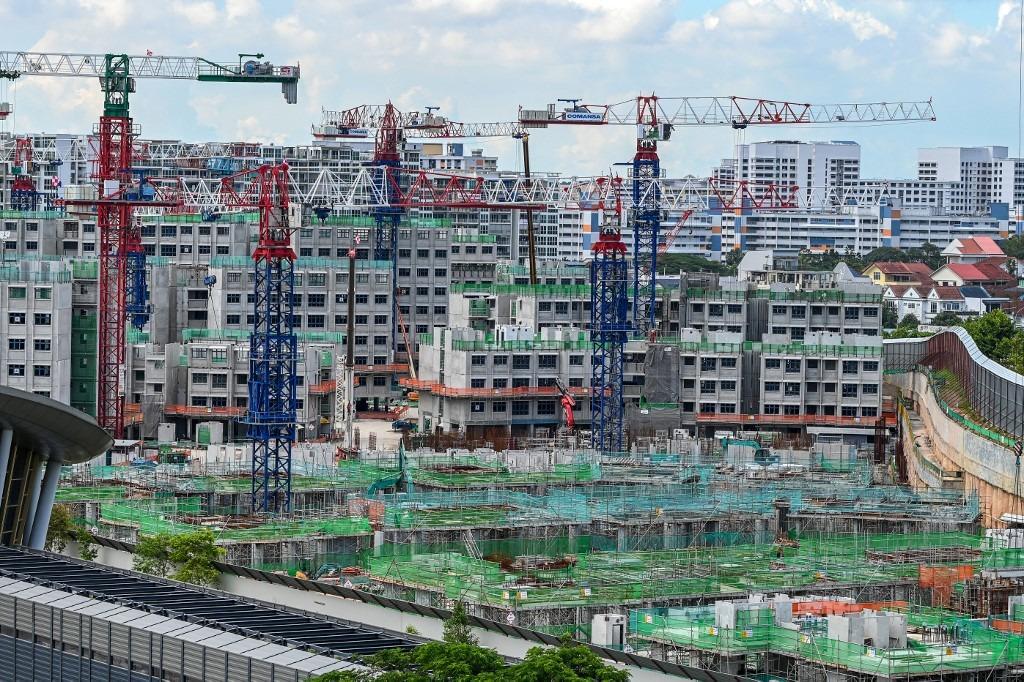 A general view shows a public housing construction site in Singapore on March 29, 2023. (PHOTO / AFP)
A general view shows a public housing construction site in Singapore on March 29, 2023. (PHOTO / AFP)
SINGAPORE - Companies in Singapore are partially paying housing costs of employees and even relocating staff to cheaper neighboring cities to help them tackle home rents that rose last year at their fastest rate in 15 years.
But with private housing rents in Singapore maintaining the scorching pace of gains in 2023, those steps are likely falling short, forcing expatriate workers to even consider leaving the city for good.
An exodus of foreign talent due to unaffordable housing costs would be a setback to Singapore in fulfilling its ambitions of becoming a technological and innovations hub. Those factors could also reduce the city-state's appeal to companies and their employees.
"We are weighing our options...whether the inflated price tag now is really worth the edge Singapore has over its neighbors," said Lee Soo Min, a business development executive at a digital advertising firm who saw a 70 percent jump in her monthly rentals and is examining relocating to another Asian city.
Rents for private properties in Singapore increased about 30 percent last year, said real estate consultant Knight Frank. Private property rents tacked on a 7.2 percent gain in the first quarter of this year, after jumping 7.4 percent in the last quarter of 2022
Foreigners without permanent residency account for 28 percent of Singapore's 5.6 million people, according to government data. Most tend to rent homes, leaving them vulnerable to the landlord's market that has been seen since 2022.
Rents for private properties in Singapore increased about 30 percent last year, with luxury residential rent gains outpacing those in London and New York in the fourth quarter, said real estate consultant Knight Frank. Private property rents tacked on a 7.2 percent gain in the first quarter of this year, after jumping 7.4 percent in the last quarter of 2022.
James Ong, an assistant product engineer from Malaysia employed in an aviation company receives an additional S$70 ($52.73) a month in rent support from his firm but that barely covers the 50 percent increase in his monthly rent to S$4,000.
In a survey report published in March, the European Chamber of Commerce in Singapore said about 40 percent of 268 firms it polled were giving employees additional aid of more than S$1,500 a month because of rent increases. If the situation worsens, 70 percent of the firms are ready to move foreign staff overseas, it said.
A surprise tax hike announced last month on foreigners' property purchases could keep rents elevated as potential buyers would now be driven into renting, offsetting some of the moderating impact from the government's move to build more homes, according to analysts.
READ MORE: Singapore's property tax hike a 'freezing measure' for foreigners
In response to Reuters' queries, the government acknowledged "significant concern" about rental trends that it said are "comparable to major cities". But the national development ministry and the economic development board said in a joint statement that prices should fall as more homes are built.
Expat woes
Recruitment companies said most expats in Singapore do not get housing allowances as companies are controlling their costs amid an uncertain global economy.
Expats in Singapore who do get housing aid would have it capped at 30 percent to 40 percent of their monthly salary, Andrea Wong, managing director at human resource consultancy Robert Half, said
Those who do get housing aid would have it capped at 30 percent to 40 percent of their monthly salary, Andrea Wong, managing director at human resource consultancy Robert Half, said.
Sachet Sethi, a senior manager at recruitment firm Robert Walters, said even those in management roles are finding it difficult to cope with costs.
"For senior management movements, candidates have been asking for housing assistance rather than equity or shares to cover the increasing cost," he said, adding that overseas candidates are also taking longer to decide on relocating to Singapore.
Joshua Yim, chief executive at recruitment firm Achieve Group, said companies are increasingly offering remote working options for white-collar workers and some are relocating their staff to cheaper cities such as Kuala Lumpur and Bangkok.
ALSO READ: Singapore executes citizen for cannabis trafficking
An executive managing a team of 100 engineers for a tech firm in Singapore said he is considering starting a satellite office on the Malaysian island of Penang so that they can retain talent.
The Singapore government, however, said the city-state "continues to be a very liveable" city, citing healthcare, education, connectivity and rule of law, and that it draws "significant investments".
"Higher demand for rentals can only be the result of more attractiveness to global talent and not less," it said.
That is cold comfort for Briton Natalie, who has been living in Singapore for 15 years and is facing an S$3,200 increment in monthly rent.
"This is absolutely the biggest jump in rent I've seen so far ... myself and many friends will have to leave Singapore if the situation gets worse," said Natalie, who did not want her last name mentioned.



